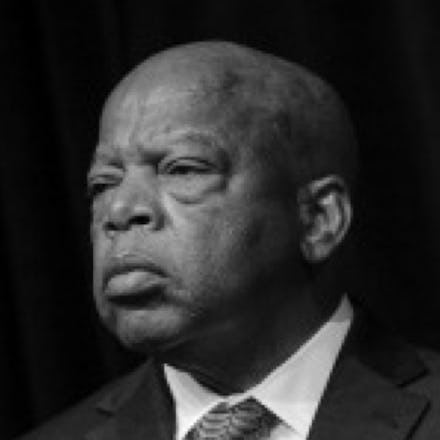John Lewis

This article is part of the Black Monuments Project, which imagines a world that celebrates black heroes in 54 U.S. states and territories.
John Lewis is one of the most legendary civil rights leaders of the 20th century. Inspired by the work of the Rev. Martin Luther King Jr. — who would eventually become one of his confidants — Lewis became one of the most influential voices against segregation in the Jim Crow South.
Lewis — who was born to sharecroppers outside of Troy, Alabama, in 1940 — started his activism at historically black university Fisk University. As a student at Fisk, Lewis organized sit-in demonstrations at segregated lunch counters in Nashville, Tennessee. He also participated in Freedom Rides, where he sat in seats reserved for white patrons on segregated buses. He went on to become a leader in the Student Nonviolent Coordinating Committee, where he worked on voter registration drives and community action programs.
In 1963, Lewis was the keynote speaker for the historic March on Washington as one of the “big six” leaders of the civil rights movement. He is the only speaker who is still living today. “By the force of our demands, our determination and our numbers, we shall splinter the segregated South into a thousand pieces and put them together in the image of God and democracy,” Lewis said in his 1963 speech. “We must say: ‘Wake up America! Wake up!’ For we cannot stop, and we will not and cannot be patient.”
Then in Selma, Alabama, on March 7, 1965, he led around 600 people across the Edmund Pettus Bridge in a march to Montgomery to advocate for voting rights in the state. The march would later be referred to as “Bloody Sunday,” as Alabama state troopers met them at the foot of the bridge. When protesters refused to turn back, the state troopers set off tear gas and beat the nonviolent protesters with clubs. That gruesome march where Lewis’ skull was fractured — reenacted in Ava DuVernay’s Selma — helped accelerate the passage of the Voting Rights Act of 1965.
As an advocate for nonviolent resistance, Lewis has said he’s been arrested over 40 times during the movement for equality. He was elected to Congress in November 1986 and has served as U.S. Representative of Georgia’s Fifth Congressional District since then. He has won recognition including 50 honorary degrees and a Medal of Freedom from former President Barack Obama.
Lewis doesn’t seem to be slowing down anytime soon. In January, he told attendees at the Women’s March in Atlanta that he was “ready to march” again in opposition to hatred and inequality.
March on, indeed, Rep. Lewis.